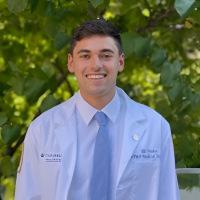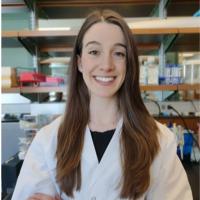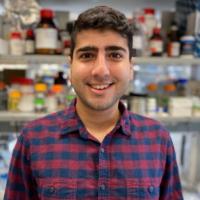Trainee Associate Member Program
Apply Now | Meet the TAM Leadership Board | Upcoming Events | FAQs | Stay Connected

What is the Trainee Associate Member Program?
The Herbert Irving Comprehensive Cancer Center’s Trainee Associate Member (TAM) Program fosters the professional development of predoctoral and postdoctoral researchers engaged in cancer-focused research. We connect trainees across Columbia with collaborative opportunities, funding, and expert guidance.
As a Trainee Associate Member, you will have access to a community of cancer trainees and mentors, pilot grants, seminar series and educational events, career development opportunities, and more.
Benefits of the Trainee Associate Member Program
Trainee Associate Members benefit from a robust set of opportunities that support their research, professional growth, and career exploration. Trainees are limited to two TAM awards/grants per two-year membership term and may only receive the same award/grant once per term.
Funding Opportunities
TAM members can apply for the following grants and awards:
- Predoctoral Pilot Grants: Graduate students may apply for $5,000 research grants. Up to three awarded annually. Example application here.
- Postdoctoral Pilot Grants: Postdocs, residents/fellows, and associate research scientists may apply for $10,000 grants. Up to five awarded annually. Example application here.
- Travel Awards: Receive up to $1,000 to present your research at academic conferences. Open quarterly (January, April, July, September). Apply here when open.
- Paper(s) of the Year: Up to six TAM-authored publications are selected annually for scientific merit and impact. Each awardee receives a $500 salary bonus.
Professional Development & Training
- TAM Annual Symposium: Members are expected to participate by presenting posters or giving talks at our one-day HICCC-hosted research symposium.
- Career Development Events: Attend networking panels featuring leaders in academia, biotech, science communication, philanthropy, and policy. Panel discussions are followed by informal meet-and-greet sessions with speakers.
- Lunches with Distinguished Speakers: Priority access to attend small-group lunches with invited HICCC seminar speakers.
- Career Counseling: Each TAM may schedule one 30-minute session per semester with a CRTEC leader for personalized career guidance. To set up an appointment, select which CRTEC leader best fits your needs and email them directly.
- Near Peer Mentoring Program: Join a cross-level mentoring network that pairs undergraduate scholars from programs such as YES in THE HEIGHTS and Columbia’s Charles Drew Pre-doctoral Society with doctoral and postdoctoral TAMs to build community, mentorship, and shared learning in cancer research.
Trainee Associate Members Resources and Other Perks
- HICCC-Branded Merchandise: All TAMs receive branded fleece to celebrate their affiliation at the annual symposium.
- Trainee Newsletter: Weekly updates feature funding opportunities, events, research highlights, and member news. Subscribe now.
- Visibility & Recognition: TAM achievements are highlighted on the HICCC website and in internal member communications.
Trainee Associate Member Spotlights
Nadja Zhakula, PhD candidate in Dr. Alison Taylor's Lab, researching aneuploidy-associated therapeutic vulnerabilities in squamous cancers.
"The TAM program has provided me with a network of other students researching fascinating topics. I have presented my work at the
TAM symposiums and was awarded a TAM pilot award which provided me with funding to use our confocal microscopy core. Being a part of TAM has been a truly invaluable experience throughout my PhD."
Nicolae Ciobu Zubenco, PhD candidate in Dr. Viraj Sanghvi’s lab, researching the role of overnutrition in tumor metabolism and antitumor immunity in hepatocellular carcinoma.
"Being part of the TAM program has allowed me to apply for internal grants, such as the TAM Predoctoral Pilot Award, which provided crucial support to advance my research and offered early experience in grant writing."
Trainee Associate Member Program Leadership Board
Our TAM Leadership Board is a dedicated team of trainees who represent the voice of their peers. The Board advises HICCC on programming and builds community through events and outreach.
If interested in joining, contact Diana Rosendo, MEd at dr3360@cumc.columbia.edu
Board Members
Claudia Aiello
- MD PhD Student
Claudia is a fourth-year MD-PhD student, currently completing her dissertation research in the lab of Dr. Donna Farber. Her work focuses on tissue-resident memory immune cells and their roles in tumor immunity. Outside the lab, Claudia enjoys running and biking along the West Side Highway and through Central Park, as well as exploring the restaurant and bar scene near her home in Lincoln Square.

Robert Hincapie, PhD
- Postdoctoral Research Scientist
Robert is a postdoctoral fellow in the Department of Biomedical Engineering, advised by Dr. Santiago Correa. Robert joined the Correa lab (and Columbia) in October 2023. He is interested in immunoengineering using glycans and self-assembling biomaterials, in chemical biology and bioconjugate chemistry, in mentorship, in distance running, and in catching up on the latest season of his current TV obsession.

Jenny Jin
- MD PhD Student
Jenny Jin is an MD-PhD student in the Stockwell lab studying the interplay among ferroptosis, diet/nutrition, and cancer therapy. She received her BA in Biochemistry from Columbia University, where she worked in the Stockwell lab to characterize and optimize ferroptosis biomarkers. Outside of the lab, she enjoys reading books from all different genres, attempting the NYTimes crossword, and exploring NYC (especially the food scene).

Eli Pinker
- Medical Student
Eli is a third-year medical student at VP&S with a bachelor's degree from Columbia University. His research with Dr. Ran Reshef focuses on characterizing immune reconstitution following CAR-T therapy, with additional interests in the gut microbiome’s role in GVHD in bone marrow transplant patients. Before attending medical school, Eli taught high school science, reflecting his passion for education. Beyond medicine, Eli enjoys cooking, rock climbing, and traveling.

Laura Quevedo, PhD
- Postdoctoral Research Scientist
Laura is a postdoctoral research scientist in the Palomero Lab at Columbia University. She uses single-cell and multi-omic approaches to study hematopoietic stem cell aging in a mouse model and also investigates peripheral T-cell lymphomas using both murine models and human samples, with a focus on how the tumor microenvironment is shaped by PI3K inhibition. Laura joined Columbia in April 2023 after earning her PhD in Spain, where she studied tumor heterogeneity in pancreatic cancer. Outside the lab, she enjoys spending time with family and friends, staying active through sports, and traveling.

Megan Rodriguez
- MD PhD Student
Megan is a third year in the MD-PhD program at Columbia. She is a member of Brent Stockwell’s lab, and she studies how different lipid species induce ferroptosis in cancer and immune cells. She is interested in pursuing a career as a neuro-oncologist. In her free time, she enjoys running (will be running her first half marathon this spring!), painting, exploring New York City restaurants and museums, and dinners with friends.

Daniel Naveed Tavakol, PhD
- Postdoctoral Research Scientist
Naveed Tavakol is a postdoctoral research scientist in the lab of Dr. Gordana Vunjak-Novakovic, working on translational approaches to integrated organ-on-a-chip systems to model cancer, with a specific focus on the immune system. He is also passionate about mentorship, science communication, and building an inclusive scientific community. Naveed also received his PhD from Columbia in 2023 with work focusing on engineering human models of the bone marrow. Previously, Naveed was a Whitaker International Fellow at the EPFL in Switzerland (2017-2018) and graduated from the University of Virginia with a B.S. in biomedical engineering in 2017.

Shannon Weng
- MD PhD Student
Shannon is a third year MD-PhD student in the labs of Peter Sims (Systems Biology) and Kam Leong (Biomedical Engineering). She is working on using nanoparticles to generate CAR-macrophages in situ for treating colorectal cancer. In her free time, she enjoys seeing Broadway shows, singing, dancing, and walking around the city. She’s excited to connect with other TAM members and faculty at HICCC!

How do I apply or renew my membership?
You can apply and renew your membership annually via the online form.
What’s the time commitment?
Being a TAM member is very flexible! You can attend events and apply for funding as needed. Board members commit a few hours monthly.
Can I join the Leadership Board?
Yes, elections are held annually and open to all TAMs. Nominations are collected in February for an April-March cycle of service.
What support is available to members?
TAMs receive tailored funding alerts, professional development invitations, mentoring, and specialized support and awards.









